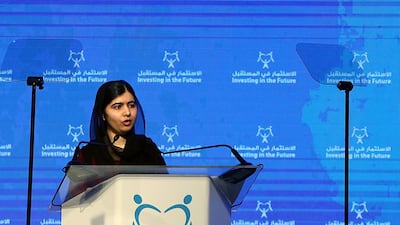SHARJAH // Malala Yousafzai on Wednesday called for an end to war and conflict and to empower women and girls through education, to give them a voice and independence.
Ms Yousafzai, the youngest person to win the Nobel Peace Prize at age 17, used the Investing in the Future conference in Sharjah to ask people to unite to end conflict and make a commitment to ensure equality for women across the world.
“On one hand there is poverty, injustice and lack of funding in education that is impacting children and women, and on the other hand there are conflicts and wars making the situation far worse,” said Ms Yousafzai at the opening of the two-day conference on building the resilience of women and girls in the Middle East.
“The situation is a challenge to us all. We cannot talk about investing in the future of this region without calling for an end to bombings and attacks. We need unity of Muslim people in Muslim countries. Together we must make a promise to this generation to empower them with education; there is a need to bring peace and prosperity to countries.”
The Pakistani, now 19, survived a near-fatal attack by the Taliban four years ago on a school bus in the Swat Valley when they tried to kill her for advocating education for girls.
Ms Yousafzai said she planned to study philosophy, politics and economics at university, but could not stop thinking of girls in Syrian refugee camps in Jordan and Lebanon with similar dreams of peace and an education.
Referring to the bombings in Syria, Yemen, Iraq and the conflict in Afghanistan, she said: “I also cannot stop thinking of my sisters in Pakistan and Afghanistan who become victims of early child marriages and lose the opportunity to study further. I cannot stop thinking of 500,000 children in Mosul under threat of being used as human shields. I cannot stop thinking of nearly half a million children at risk of starvation in Yemen.”
Urging men to speak up and encourage women to dream, she vowed to continue her struggle for quality education, women’s empowerment and peace.
The conference was organised by The Big Heart Foundation and attended by more than 300 gender-equality advocates and officials. In a video message, Sheikha Jawaher bint Mohammed Al Qasimi, the foundation’s chairwoman, asked people to stand by women and invest in their capabilities.
Sheikh Sultan bin Mohammed Al Qasimi, the Ruler of Sharjah, pointed to the strong representation of women in the UAE Cabinet, federal and local institutions. He called for the country and its women to be at the forefront of the science and technological revolution.
Cases of rape during war and attacks on women in refugee camps were also addressed.
Rula Ghani, the first lady of -Afghanistan, advocated increased help for women and girls in camps, providing training to rebuild their lives and addressing psychological needs.
“We need to come together and rescue our sisters so they do not think we have forgotten them,” she said. “Let us give our wandering sisters the skills to help them stand on their feet.”
Sheikh Abdullah bin Zayed, Minister of Foreign Affairs and International Cooperation, said every official should speak about the role of women in the country’s history. “In the UAE, men did not build the country alone, women played an important role and were also pillars of society,” he said.
Indian child rights activist Kailash Satyarthi, who shared the Nobel Peace Prize with Ms Yousafzai, said investing in women’s education would have an economic impact, while reducing infant mortality and child labour. “We can lead a worldwide movement investing in women and girls through technology to end the digital divide,” he said.
rtalwar@thenational.ae


